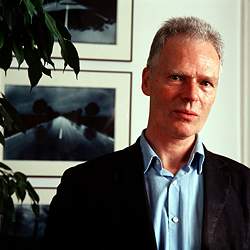|
<< -- 2 -- Malcolm Miller CHORAL CENTENARY

The world première of that early work in Germany in 1984, over fifty years after its
composition, remarkably resulted in the commission of Belsatzar. And if it had been the
pointed social critique of Letze Kapitel which initially delayed its German première
in the thirties, in any event all Goldschmidt's works were banned from public performance in Nazi
Germany after 1933, forcing the promising young composer and prize-winning Schreker student to find
refuge in Britain in 1935. In these two settings of poems by Erich Kastner (well known as author
of Emil and the Detectives), Goldschmidt's idiom is redolent of his erstwhile contemporaries
Weill and Eisler, cool detachment matched by near atonality, and a blend of lyricism with
sprechgesang.
The first setting, A masked ball in the Mountains, is a witty satirical
movement, in a jazzy Weill-like idiom, depicting yuppy aristocrats at a dinner party who take to
their skis only to be frozen solid. Alberto Portugheis, accompanied by pointed percussion, played
the snappy, syncopated piano part with panache. The second, Letzte Kapitel (the 'Final
Chapter'), held a particularly timely topicality at this concert, as it deals with Kastner's
ominous prediction of the destruction of humankind on 12 July 2003, satirically depicted as an
end to human conflict! The narration was sung in English with choral commentary in German, a
happy compromise which conveyed the flavour of the original alongside audience comprehensibility.
The performance sustained the dramatic structure throughout, shifting deftly from
sprechgesang to lyrical textures, with well-coordinated ensemble and effective dynamics,
notably the smooth sustained final paragraph which conjures up the 'dehumanised' desolation.

Robin Holloway
|
The first of the two world premières was Holloway's Canzona and Toccata for
trumpet and organ performed boldly by the trumpeter Deborah Calland, wife of the Festival
Director Barry Millington, with the organist William Whitehead. The composer was present to
receive warm audience applause for the substantial two-movement piece, adapted from an earlier
sonata for trumpet itself revised for two trumpets, the organ part expanded out from one of the
trumpet parts. The first movement explored the lyrical aspects of the instrument, its angular
melody laced with unexpected twists and turns, yet firmly rooted in a tonal idiom in some respects
stilted and rearguard, distant and aloof, paradoxically gaining a passionate edge only towards the
end when at its most Wagnerian. The second movement was itself divided into two sections, and
far jazzier with syncopated rhythmic organ passages and an affirmative fanfare-style conclusion.
Perhaps this piece did not match the composer's recent symphonic works, straying too safely
towards audience appeal, and certainly there was far more harmonic bite to his 1984 choral setting
Since I believe which followed. This engaging miniature abounded in unusual modulatory
corners of unexpected resolution, its choral syntax subtle and idiomatic.
Continue >>
Copyright © 15 May 2003
Malcolm Miller, London, UK

|

